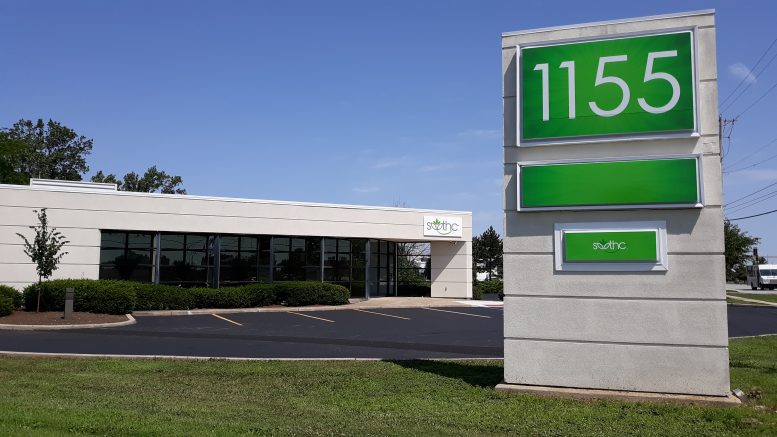By JAN LARSON McLAUGHLIN
BG Independent News
Every day in Bowling Green, 25 to 30 people buy marijuana – legally.
After nearly five months in business, Soothe, the medical marijuana dispensary in Bowling Green, is seeing a growing clientele.
“We’ve had steady growth in the number of patients,” said Mark Jacobs, owner of the business and an attorney from Toledo. “Many of them have been helped.”
The dispensary, at 1155 N. Main St., is the only medical marijuana site in the region of Wood, Hancock and Henry counties.
“We’re happy to be doing business in Bowling Green,” Jacobs said.
“There are a lot of people who have very serious medical issues,” Jacobs said, listing off pain, digestive and insomnia issues that are relieved by marijuana. He estimated 75 to 80 percent of the patients served at the Bowling Green dispensary are using the marijuana to reduce the symptoms of serious health issues.
“We see a lot of new patients,” as people realize the dispensary is open and apply to get medical cards allowing them to purchase medical marijuana.
As more people with certain medical conditions learn that the Soothe dispensary is in business, the demands will grow, Jacobs said.
“We’re hoping and expecting the number will grow,” he said.
But getting the word out means cutting through some red tape. Any advertising for the dispensary must be approved by the Ohio Board of Pharmacy. And the information released by the government has been limited, Jacobs said.

“I don’t think there’s a lot of information out there from the state,” he said.
But overall, state officials have worked well with the medical marijuana dispensaries in Ohio to solve problems with packaging the labeling, Jacobs said. The relationship has not been adversarial, he said.
“It’s been remarkable how the state has worked with us to work through any issues,” he said.
One of the issues has been keeping up with inventory. It takes about 90 days to grow the marijuana and process it for medical use.
“Some of the product we’ve run out of,” Jacobs said. “We want to have something people really like.”
Approximately 25 growers in Ohio have been licensed by the Ohio Department of Commerce. From there, the raw marijuana is turned into oils, tinctures and edibles.
“Everything we’re selling has been grown and processed in Ohio,” Jacobs said.
Soothe is staffed with employees who have expertise in directing patients on how to become qualified for medical marijuana, and then how to get the product right for them, he said.
“I think our reputation will help us,” he said.
The following forms of medical marijuana are sold at Soothe: oils, tinctures, plant material, edibles and patches. The law prohibits the use of medical marijuana by smoking or combustion, but does allow for vaping.
In order to get the marijuana, patients must be put on a registry by a certified physician. Patients are required to present a card to Soothe employees when they request marijuana. Patients can apply on the soothebg.com website.
Soothe has a licensed pharmacist, staff who can consult with patients about the best form of marijuana for their use, and security staff.
There are currently 21 medical conditions that qualify for use of medical marijuana. Doctors must register with the state, which requires completion of continuing education about cannabis, before being able to recommend marijuana to patients with whom they have bona fide relationships. A physician is not permitted to recommend medical marijuana use until the physician has obtained a certificate from the State Medical Board of Ohio.
Certified physicians may recommend medical marijuana only for the treatment of a qualifying medical condition. Under Ohio law, all of the following are qualifying medical conditions: AIDS, amyotrophic lateral sclerosis, Alzheimer’s disease, cancer, chronic traumatic encephalopathy, Crohn’s disease, epilepsy or another seizure disorder, fibromyalgia, glaucoma, hepatitis C, inflammatory bowel disease, multiple sclerosis, pain that is either chronic and severe or intractable, Parkinson’s disease, positive status for HIV, post-traumatic stress disorder, sickle cell anemia, spinal cord disease or injury, Tourette’s syndrome, traumatic brain injury, and ulcerative colitis.
Visit www.medicalmarijuana.ohio.gov for more details.



